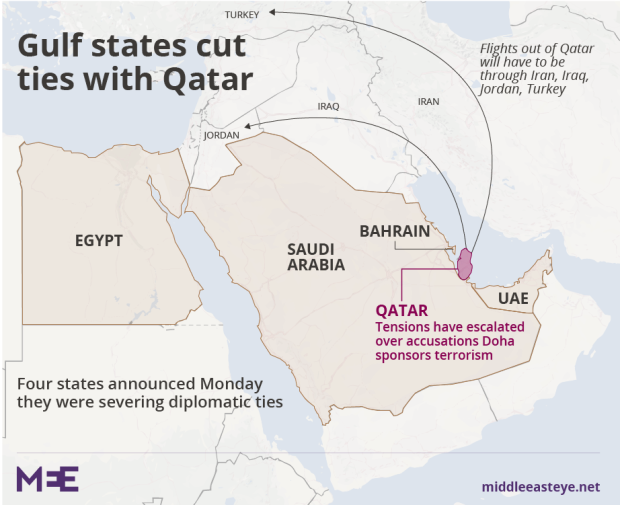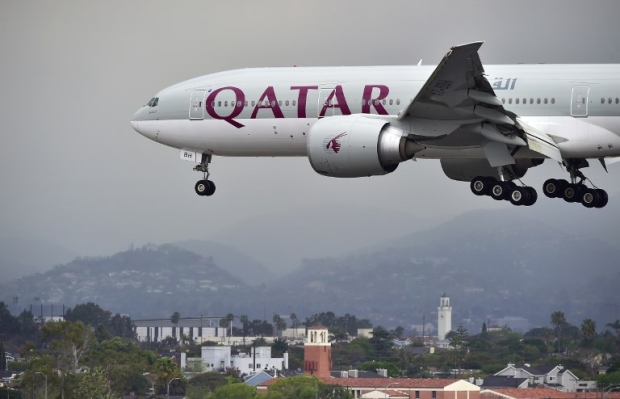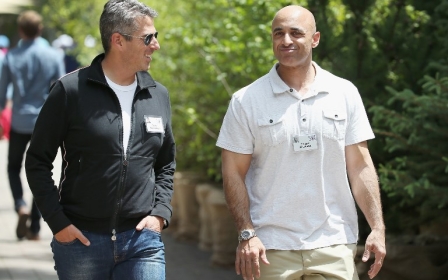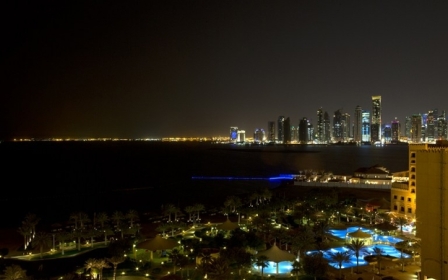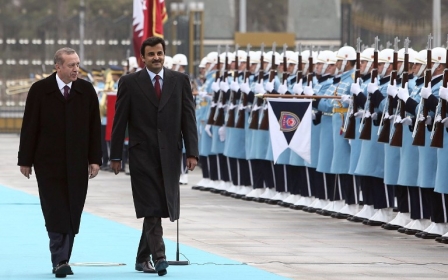Qatar hits back as Saudi, Egypt, UAE cut diplomatic, transport ties
Qatar has slammed the decision of three Gulf states, Egypt and the Maldives to sever ties with it on Monday, saying they were "unjustified" and aimed to put Doha under political "guardianship" as Turkey called for dialogue.
Saudi Arabia, Egypt, the United Arab Emirates and Bahrain cut their ties with Qatar and expelled the Gulf state from the coalition fighting the war in Yemen, accusing it of supporting terrorism. It opens up the worst rift in years among some of the most powerful states in the Arab world.
The Maldives soon followed suit in severing all ties with Qatar, the government said.
"The measures are unjustified and are based on false and baseless claims," the Qatari foreign ministry said in a statement, referring to the unprecedented step.
'The measures are unjustified and are based on false and baseless claims'
- Qatari foreign ministry
"The aim is clear, and it is to impose guardianship on the state. This by itself is a violation of its (Qatar's) sovereignty as a state," it added.
To "protect its national security from the dangers of terrorism and extremism" Riyadh decided to "sever diplomatic and consular ties with Qatar, and to close all land, sea and aviation" links, a Saudi official cited by the official Saudi Press Agency said.
Riyadh ordered its nationals to leave Qatar within 14 days and barred Qataris from the kingdom.
Translation: The people of Qatar in Saudi Arabia heading toward their country #GulfPeopleRefuseBoycottingQatar
"(Qatar) embraces multiple terrorist and sectarian groups aimed at disturbing stability in the region, including the Muslim Brotherhood, ISIS (Islamic State) and al-Qaeda, and promotes the message and schemes of these groups through their media constantly," SPA said, in an apparent reference to Qatar's influential state-owned channel Al Jazeera.
The statement accused Qatar of supporting what it described as Iranian-backed militants in Saudi's restive and largely Shia Muslim-populated eastern region of Qatif and in Bahrain.
Turkey 'saddened by the rift'
The coordinated move dramatically escalates a dispute over Qatar's support of the Muslim Brotherhood, the world's oldest Islamist movement, and adds accusations that Doha even backs the agenda of regional arch-rival Iran.
The US appeared to attempt to play down the spat. Speaking to reporters in Sydney on Monday, US Secretary of State Rex Tillerson said that the rift would not affect the fight against Islamist militants and that Washington has encouraged its Gulf allies to resolve their differences.
"I do not expect that this will have any significant impact, if any impact at all, on the unified - the unified - fight against terrorism in the region or globally," Tillerson told reporters in Sydney after meetings between Australian and US foreign and defence ministers.
Turkey's Foreign Minister Mevlut Cavusoglu said he was saddened by the rift, and called for dialogue to resolve the dispute.
"We see the stability in the Gulf region as our own unity and solidarity," Cavusoglu told a news conference.
"Countries may of course have some issues, but dialogue must continue under every circumstance for problems to be resolved peacefully. We are saddened by the current picture and will give any support for its normalisation," Cavusoglu said.
Turkey, which has good relations with Qatar as well as several of its Gulf Arab neighbours, wanted to help resolve the dispute, Turkish Deputy Prime Minister and government spokesman Numan Kurtulmus said.
"Our president is carrying out phone diplomacy, and we are hoping for a diplomatic solution through dialogue," Kurtulmus told reporters after a cabinet meeting.
Libya's eastern-based government announced it was following its regional allies in cutting diplomatic ties with Qatar, its foreign minister, Mohamed Dayri, said on Monday.
The government, which sits in the eastern city of Bayda, has little authority within Libya. It is appointed by a parliament that also sits in the east and is aligned with powerful military commander Khalifa Haftar. They have spurned a UN-backed, internationally recognised government in the capital, Tripoli.
Egyptians in Qatar anxious
Egyptians seeking to escape economic crisis at home have poured into the Gulf and many of them in Qatar were panicked by the latest diplomatic rift, in which Saudi Arabia, Bahrain and the United Arab Emirates have accused Doha of backing terrorism.
"My phone has not stopped ringing since 4 a.m.," Mohammed al-Iraqi, the head of the Egyptian community in Qatar, told Reuters by telephone from Doha.
"Egyptians are scared. They have jobs and a stable life here with their families. There is a state of panic," he said, speaking shortly after the diplomatic break was announced in the small hours of Monday morning.
Foreign workers make up around 1.6 million of Qatar's 2.5 million population, and according to al-Iraqi about 350,000 of them are Egyptians, making them one of the biggest foreign contingents in the Gulf country.
Egyptians in Qatar are apprehensive and say that so far the main issue is food. At least 40 percent of Qatar's food products are imported from Saudi Arabia and photos of grocery stores in Doha shared with Reuters by residents showed empty shelves.
Private sector workers were not worried about deportations, saying they did not think it was in the interest of their companies to take such actions. Those in the public sector were more concerned.
"We are at the mercy of the (Qatari) government. So far there are no indications that we will be kicked out but it could happen at any moment," said one public sector worker who did not wish to be identified.
"And then even if we are deported, how would we leave? We are hearing all sorts of news about flight suspensions."
US military base
The measures are more severe than during the previous eight-month rift in 2014, when Saudi Arabia, Bahrain and the UAE withdrew their ambassadors from Doha, again alleging Qatari support for militant groups. But at that time, travel links were maintained and Qataris were not expelled.
A split between Doha and its closest allies is likely to have repercussions around the Middle East, where Gulf states have used their financial and political power to influence events in Libya, Egypt, Syria, Iraq and Yemen, and where there are significant US miltiary interests.The diplomatic fallout also threatens the international prestige of Qatar, which is set set to host the 2022 World Cup. For years it has presented itself as a mediator and power broker for the region's many disputes.
The region also plays an important role for the US military in the fight against Islamic State. Bahrain houses the US Navy's Fifth fleet, which patrols the Middle East and Central Asia, while Qatar is home to the Al Udeid Airbase, from where the United States carries out air strikes against militants in the region.
Iran blames Trump's 'sword dance' in Saudi Arabia
The announcements come 10 days after US President Donald Trump visited Riyadh to call on Muslim countries to stand united against Islamists extremists, and singled out Iran as a key source of funding and support for militant groups.
Iran said on Monday that it saw America pulling the strings.
"What is happening is the preliminary result of the sword dance," Hamid Aboutalebi, deputy chief of staff of Iran's President Hassan Rouhani, tweeted in a reference to Trump's recent visit to Saudi Arabia.
Trump and other US officials participated in a traditional sword dance during the trip in which he called on Muslim countries to stand united against militant groups.
Qatar has used its media and political strength to support long-repressed groups during the 2011 pro-democracy uprisings in several Arab countries.
Muslim Brotherhood parties allied to Doha are now mostly on the backfoot in the region, especially after a 2013 military takeover in Egypt ousted the elected Islamist president.
The former army chief and now president, Abdel Fattah al-Sisi, along with the new government's allies in Saudi Arabia and the UAE, blacklisted the Brotherhood as a terrorist organisation.
Egypt said on its state news agency that Qatar's policy "threatens Arab national security and sows the seeds of strife and division within Arab societies according to a deliberate plan aimed at the unity and interests of the Arab nation."
Oil prices rose after the moves against Qatar, which is the biggest supplier of liquefied natural gas (LNG) and a major seller of condensate - a low-density liquid fuel and refining product derived from natural gas.
Economic disturbances
Saudi Arabia has called on international companies to avoid Qatar, raising the prospect that it might try to make foreign firms choose between doing business in Qatar and obtaining access to the much bigger Saudi economy.
Economic disturbances loomed immediately, with the Qatari stock index sinking 7.6 percent in the first hour of trade. Some of the market's top blue chips were hit hardest, with Qatar National Bank, the country's largest bank, dropping 5.7 percent.
Saudi Arabia, the UAE and Bahrain announced the suspension of transport ties with Qatar, and gave Qatari visitors and residents two weeks to leave their borders.
Abu Dhabi's state-owned Etihad Airways said it would suspend all flights to and from Doha from Tuesday morning until further notice.
Saudi Arabia and other GCC countries traditionally account for only about 5 to 10 percent of daily trading on the Qatari stock market, according to exchange data.
But the diplomatic rift could have a serious impact on some business deals and companies in the region, particularly Qatar Airways, which can no longer fly to some of the Middle East's biggest markets.
Kunal Damle, an institutional broker at SICO Bahrain, said Qatari state funds might step in to support their market later in the day.
New MEE newsletter: Jerusalem Dispatch
Sign up to get the latest insights and analysis on Israel-Palestine, alongside Turkey Unpacked and other MEE newsletters
Middle East Eye delivers independent and unrivalled coverage and analysis of the Middle East, North Africa and beyond. To learn more about republishing this content and the associated fees, please fill out this form. More about MEE can be found here.


